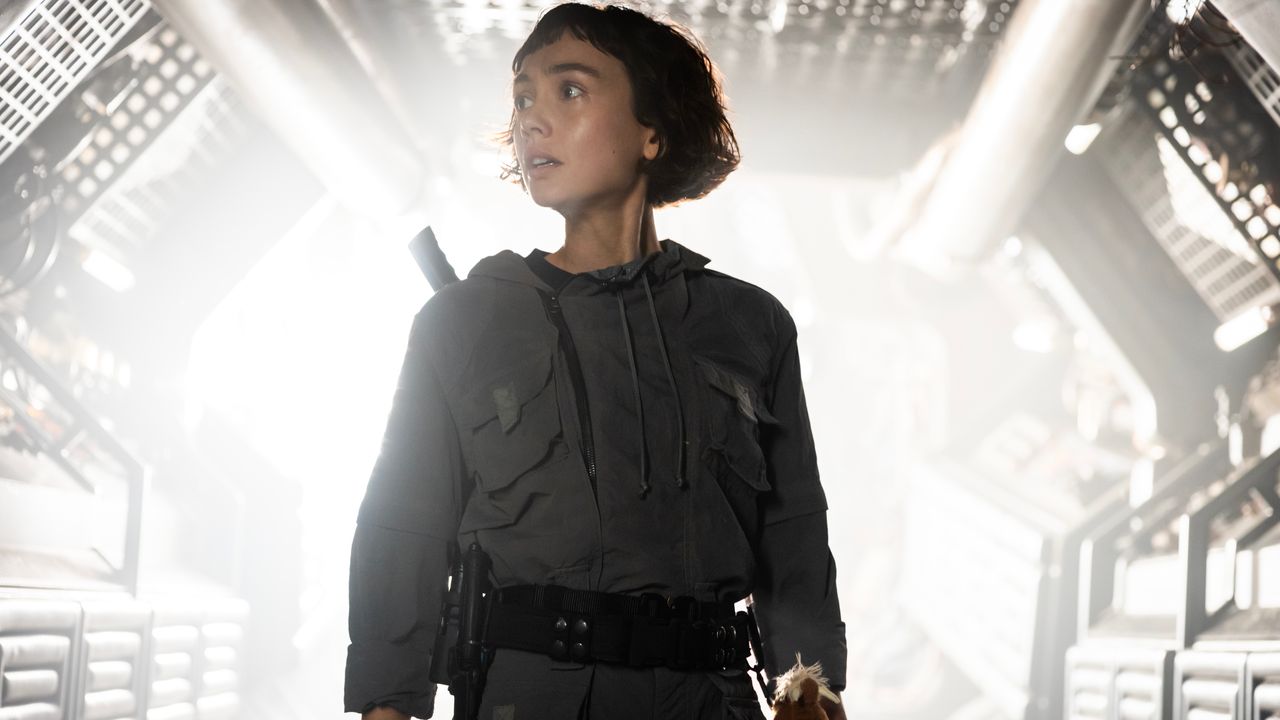It may be true that in space no one can hear you scream. But on Alien: Earth (FX on Hulu, August 12) we are privy to every screech, squish, and thud—
It may be true that in space no one can hear you scream. But on Alien: Earth (FX on Hulu, August 12) we are privy to every screech, squish, and thud—sometimes agonizingly so. Noah Hawley’s series extension of the Alien franchise—the first of its kind—is a grim, gory, and intermittently fascinating transposing of the usual format. We are no longer lost in space, instead considering a bloody mess in our own backyard.
The series takes place in 2120, when the planet has given up trying to sustain democracy and ceded control over to a handful of megacorporations. Pretty much everyone around the globe is subject to at least one of these sinister entities, toiling under impossible contracts or—in the case of our adolescent heroes—manufactured by them. Sydney Chandler, moony eyed and Amélie coiffed, plays Wendy, a once sickly child whose consciousness has been placed inside a synthetic adult body. She and her “siblings,” all named after members of Peter Pan’s tribe of Lost Boys, live at the secretive island facility owned by the Prodigy Corporation, the newest upstart in the world economy run by a youthful and likely sociopathic trillionaire known as the Boy Genius (Samuel Blenkin).
These kids are meant to be miracles, emblems of hope. Here is the chance for any ailing child, or potentially any adult, to slip the ravages of mortal flesh and be born anew; forceful, seemingly invincible, transcendent. All they have to do is survive the curious and cruel ministrations of humanity—which, as any Alien movie will tell you, is awfully challenging to do.
As usually happens in these tales, frightening space monsters are discovered, and soon the Boy Genius’s attention pivots toward them. He’s a bit bored of his innocent immortals, energized by the arrival of these creepy, crawly instruments of death. Alien: Earth doesn’t only feature the typical face-huggers and xenomorphs. Hawley invents other bugs and icky entities, risky creatures who are—in the spirit of Jurassic Park—just trying to defend themselves in a recent and often hostile environment.
The series is broken up into multi-episode narratives, the first being the crash of the ark bearing all these beasties. It’s a Weyland-Yutani ship (that’s the company that employs most of the doomed adventurers in the film series) that has smashed into one of Prodigy’s gleaming cities in Southeast Asia. Wendy and the Lost Boys—at their pleading—are sent on their first mission to secure the crash site and scavenge whatever they can find. They are joined by their instructor-minder, a wholly synthetic being named Kirsh (Timothy Olyphant, white-haired and prowling). What results is a sort of action-thriller, an engaging but perhaps overly drawn out descent into the belly of the ship (and the building it crashed into)—a long prologue to the horror to come.
There is a flashback episode dedicated to what happened on that accursed vessel—a bracingly effective reworking of the first Alien film. But otherwise, the season shifts its focus near entirely to the lush, verdant Prodigy island, a Neverland Wendy soon realizes is more prison than sanctuary. She’s got her human brother, Hermit (Alex Lawther), with her, while a dogged Weyland-Yutani operative, Morrow (a mesmerizing Babou Ceesay), pursues the biological matter that was nicked from the ship.
As various plotlines converge and connect, Hawley ponders matters of consciousness and power, nurture vs. nature, and what transhumanist morality might possibly look like. He’s got economic issues on his mind too; particularly in the first half of the season, in which we’re familiarized with the terrible, dehumanizing systems of a planet ruled by substantial business. Some of Hawley’s inquests yield more fruitful results than others. The evolution of Wendy and her friends from awkward, impulsive children stuck in adult bodies to actualized superbeings feels cloudy and arbitrary. As is often true of this franchise, the philosophical-existential stuff is never quite as deep as it wants to be. (See: Prometheus and Alien: Covenant.)
But on a mechanical and biological level—and on its technical merits—the series is a gripping marvel. The aliens, skittering and slinking, are dreadful delights, especially one creature whose nature I won’t spoil here. You’ll know it when you meet it. Hawley imbues the franchise with ribbons of his peculiar, sideways humor, much as he does on his series Fargo. There’s an amusing inevitability to the season’s ruinous entropy, a clock loudly ticking as humans and synths peer at menacing creatures from the other side of the glass. We know they’re going to get out, and we giddily fear what they will do once they’re loosed.
Hawley and cinematographer David Franco create finely lacquered pictures that ominously cross fade into one another; the show has the unnerving cadence of a dream curdling into a nightmare. Composer Jeff Russo’s score shrewdly blends wonder and terror with a futuristic yet old-fashioned kind of awe. It’s a pristinely styled show, a immense budget used to its fullest potential.
If there are some digressions that don’t work as well as others, I suppose that is the peril of working in a longer format. Things have tightened up by the end, at least, though we are left with the substantial question of where it could possibly go in a second season without awkwardly bumping into all the Alien stories that have come before it (though, many of them later on the franchise’s timeline). One nasty little space monster hasn’t even really gotten the chance to do its thing yet; I eagerly anticipate seeing this being self-actualize. In the meantime, I’ll wait here on our own increasingly corporatized earth, wondering how far away we really are from what Hawley so hideously, and beautifully, foretells.

COMMENTS